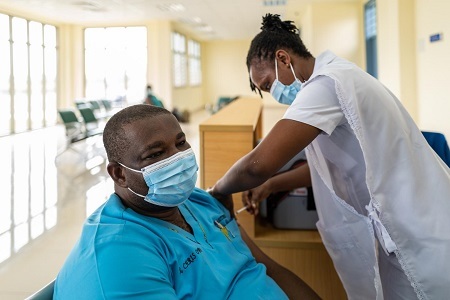Vaccination is the safest way to gain immunity to the coronavirus, and with most COVID-19 vaccines, you need two doses to get the greatest possible protection.
Immunologists call this method of giving people multiple doses “prime-boosting”. Essentially, you first teach the immune system what it is looking for – you prime it with the first vaccination.
Then, after the immune system has had time to respond to the priming, it is challenged again. The immune response learned the first time is boosted when put into practice on the second exposure.
Most (though not all) vaccines – COVID-19 or otherwise – use prime-boosting to maximise protection. Some even require further doses.
This is because immunity can wane over time or, as is the case with the flu vaccine, the virus that causes the disease can change so that the original vaccine no longer provides good protection.
With COVID-19, we have strong evidence that taking a second dose increases your defence against the disease.
Despite this, one in 40 people in the UK who have had a first dose don’t seem to be getting their second.
In the US, there have been reports of millions of people skipping their second doses. In doing so, these people are endangering their health.
Two doses clearly beneficial
The benefits of prime-boosting with COVID-19 vaccines were initially seen in clinical trials. Early studies of the currently approved COVID-19 vaccines compared the immune responses in people who received one or two vaccine doses.
Results showed that after the second dose, people had higher amounts of antibodies to fight the virus, indicating that taking more than one dose would probably increase vaccine effectiveness.
Larger clinical trials then continued with this prime-boosting regimen. With the Pfizer/BioNTech vaccine, protection against symptomatic COVID-19 was found to be 52% from 12 days after the first dose (immunity takes time to build). Protection then rose to 95% after the second dose.
With the Oxford/AstraZeneca vaccine, protection against symptomatic COVID-19 from 22 days after the first dose was estimated to be 76%. When a second dose was given 12 weeks after the first, it raised protection to 81%.
With the rollout of COVID-19 vaccines across many countries worldwide, we’re now getting real-world data that confirms the benefits of prime-boosting that were recorded in trials.
A recent British preprint – a piece of research not yet reviewed by other scientists – found that from 21 days after the first vaccine dose, coronavirus infections were reduced by 66% in people receiving the Pfizer/BioNTech vaccine and by 61% in those taking the Oxford/AstraZeneca vaccine.
But in people who had also taken second doses, these reductions then fell further to 80% and 79% respectively.
The added danger of delta
There’s also now an extra reason you should get your second dose: new coronavirus variants of concern.
These are forms of the coronavirus that have genetic mutations that may make them more transmissible, less susceptible to the protective effects of vaccines, harder to detect, or cause more severe disease.
From late 2020, the UK struggled against the alpha variant, a more transmissible form of the virus that became dominant over winter.
This variant has since been out-competed by the delta variant, an even more transmissible form of the virus that is now dominant instead.
A new lab-based study suggests that the Pfizer/BioNTech vaccine provides protection against currently circulating variants, including alpha and delta.
However, it also found that after only one dose, the ability of the vaccine to combat different variants varies significantly.
The scientists investigated the antibody responses of 250 people vaccinated with the Pfizer/BioNTech vaccine against five variants of the coronavirus, including the original “wild type” that spread in early 2020 as well as the alpha and delta variants and several other forms.
After the first and second dose, the researchers looked to see whether people had antibodies able to prevent infection – called neutralising antibodies – for these different forms of the virus.
In individuals who had received only one dose of the vaccine, neutralising antibody levels for the delta variant were significantly lower than for the alpha variant.
That is to say, the research suggested that a single dose might still afford more protection than no vaccination, but that people who had only had a single dose would be less well protected than they were before the delta variant had emerged.
Critically, these laboratory results appear to be reflected in the real world.
A preprint from Public Health England suggests that after one dose, the Pfizer/BioNTech and Oxford/AstraZeneca vaccines are 50% protective against symptomatic disease caused by the alpha variant but only 33% protective against the delta variant.
To stress, against the newly dominant variant in the UK, a single vaccine dose is less likely to stop you from getting ill.
Yet after two doses of the Pfizer/BioNTech vaccine, the paper suggests protection against symptomatic COVID-19 rises to 93% against the alpha variant and 88% for the delta variant.
The Oxford/AstraZeneca vaccine also sees a lift: after a second dose it’s 66% protective against alpha and 60% effective against delta.
The importance of having two doses is even more evident when looking at hospitalisation rates for COVID-19.
Another recent preprint from Public Health England suggests that protection against needing hospital treatment for COVID-19 caused by the delta variant goes up from 94% with one dose to 96% with two doses of the Pfizer/BioNTech vaccine.
The difference is even more marked for the Oxford/AstraZeneca vaccine, with protection rising from 71% to 92% with a second dose.
Although these findings are yet to be formally published, the evidence is strong that getting a second vaccine dose raises your protection against getting ill and developing serious illness.
Meanwhile, the new dominance of the delta variant has also made the lower protection offered by a single dose even lower than it was before. Making that second trip to the vaccine clinic is therefore critically important.
Written by Rebecca Aicheler. From The Conversation.

